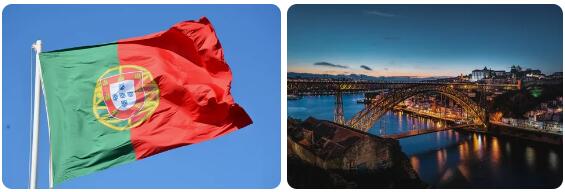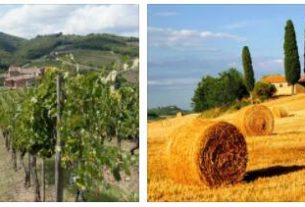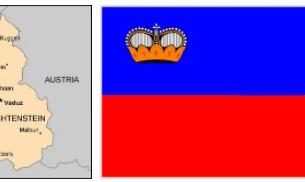Portugal – Europe’s far west
The Republic of Portugal is located in the western part of the Iberian Peninsula and marks the westernmost part of the European continent. The country stretches 550 km along the Atlantic coast, whereby it is only 150 km wide. The only neighboring country to Portugal is Spain. In the 15th century, the country rose to become a world power due to its fleet and the Portuguese expansion began. The Portuguese colonies included Brazil, Angola and Goa in India, Cape Verde Islands, East Timor and Macau. But by the 20th century at the latest, Portugal released its colonies into independence, sometimes involuntarily. Today only Madeira and the Azores belong to Portuguese territory. The capital of Portugal, Lisbon, was destroyed by a strong earthquake and subsequent tsunami wave in 1755. The quake also caused horrific losses to the population. However, the city was generously rebuilt by the colonies due to the Portuguese wealth. You can still feel this wealth today, even though Portugal fell into economic trouble with the loss of the colonies. Today the country has stabilized economically again and is a member of the European Union and the European Monetary Union.
For football fans, it should be mentioned that in the group G game – in the preliminary round of the 2014 World Cup – Germany surprisingly defeated Portugal 4-0 on June 16, 2014.
| Name of the country | Portuguese Republic |
| Form of government | Parliamentary republic |
| Head of state | President, Aníbal Cavaco Silva (since March 9, 2006) |
| Geographical location | Southwest Europe |
| National anthem | A Portuguesa |
| Population | 10.6 million (Credit: Countryaah: Portugal Population) |
| Currency | Euro (€) |
| Ethnicities | About 98% are Portuguese |
| Religions | 93% Roman Catholic, as well as Protestants, Muslims and Jews |
| Languages | Portuguese |
| Capital | Lisbon |
| Surface | 89,000 km² (with Madeira and the Azores 92,000 km²) |
| Highest mountain | Estrela with a height of 1,993 m (mainland Portugal) |
| Longest river | Duoro with a length of around 320 km |
| Largest lake | Alqueva reservoir with an area in Portugal of 187 km² |
| International license plate | P |
| National currency | Euro |
| Time difference to CET | – 1 h |
| International phone code | + 351 |
| Mains voltage, frequency | 230 volts, 50 hertz |
| Internet Top Level Domain (TLD) | .pt |
Portugal: history
Before the year 1000
Around 137 BC The Romans invaded what is now Portugal and, after long battles, defeated the local Lusitans. It was not until the 5th century that Roman supremacy was replaced by the immigrating West Germanic Swebians. In the 6th century, the Visigoths incorporated the area into their Spanish Empire. In 711 the Moors defeated the Visigoths and what is now Portugal became part of the Cordoba Caliphate.
From the year 1000 to the 17th century
According to Abbreviationfinder website, Alfons Heinrich, a descendant of the first count of the area around Porto, defeated the Moors in 1139 and was then crowned King Alfonso I in 1140. He made the area subject to the Pope in 1143 to protect it from the strong neighboring kingdom of Castile. However, it was not until 1179 that Portugal was recognized as an independent kingdom by the papacy.
In the 12th, 13th and 14th centuries, the Burgundy royal family ruled Portugal. Under him, the empire was expanded to include Lisbon and the Algarve and the internal structure of the country was consolidated. In the north the small peasant property remained, in the south, however, the lands were transferred to monasteries, orders of knights and the nobility.
In the 14th century the House of Avis took over the kingdom. Under the Avis dynasty, Portugal rose to become a world power. In 1415, Portuguese expansion began with the capture of the Moroccan trading city of Ceuta. Heinrich the Navigator drove the exploration of the African coast and the Atlantic. Madeira was discovered in 1418, the Azores in 1427 and the Cape Verde Islands in 1455. Tangar was captured in 1471. Portuguese expansion reached its peak in the late 15th and early 16th centuries. In 1498 the Cape of Good Hope and India were discovered. The Portuguese established trading establishments and brought the spice trade under their control. In 1500 Brazil was discovered and taken for the Portuguese crown. The Avis dynasty ended in 1580 and a Spanish interregnum until 1640 began. In 1630 the Dutch occupied Brazil. It was only through an alliance with England that Portugal succeeded in recapturing Brazil in the Anglo-Dutch naval war. The colony subsequently became the basis of Portuguese wealth.
In 1640, Duke John of Braganza eliminated Spanish rule in Portugal. He was crowned King John IV. His dynasty ruled Portugal until the end of the monarchy in 1910.
In the 18th and 19th centuries
Gold and diamonds from Brazil made it possible for Portugal to embody absolutism in the 18th century. Art, science and architecture were promoted. In 1755 a strong earthquake destroyed the capital Lisbon. At the end of the 18th century, slavery was abolished and the population of the colonies was equated with the Portuguese population.
In 1807 France occupied Portugal. The Portuguese court fled to Brazil and did not return to Portugal until 1820, although the English, allied with Portugal, had already expelled the French in 1811. In 1815 Brazil became an equal kingdom with Portugal. In 1820 a liberal revolution overthrew the absolutist system and replaced it with a constitutional monarchy. The 19th century was marked by party struggles, which finally culminated in a popular uprising in 1846/47, which was suppressed with the support of the English. In 1892 Portugal declared bankruptcy. The country remained an agricultural country and weakened economically after the fall of Brazil as a colony.
In the 20th century
On October 5, 1910, the last king of Portugal, Emanuel II, was overthrown after a republican military revolt and the republic was proclaimed. In 1911 the monarchy was officially abolished. In the years that followed, Portugal fell into domestic political chaos. Over 40 governments took turns in 15 years. In the First World War, Portugal took part on the side of the Entente. Domestic political problems worsened after the war. Finally, on May 28, 1926, the government was overthrown by a military coup and the constitution repealed. General Carmona took over the office of president and installed Antonio de Oliveira Salazar as finance minister and finally as prime minister. Salazar then determined political events in Portugal for 40 years. The new constitution still had democratic features, For example, elections were planned, but there was only one party under Salazar. He received substantial support from the church, the army and large landowners. Salazar supported General Franco during the Spanish Civil War. Spain and Portugal signed a non-aggression pact with the additional protocol on neutrality. However, Portugal allowed the Allies to station ships and aircraft in the Azores.
After the Second World War, Portugal was poor and unemployed. Criticism of the Salazar dictatorship grew, but the opposition was rigorously suppressed. In terms of foreign policy, Portugal left the neutral course and was one of the founding members of NATO in 1949. In 1955 the country was admitted to the UN.
In the sixties of the 20th century there were independence movements in the Portuguese colonies. Portugal tried to suppress the unrest with military force, which culminated in outright colonial wars. This course met with criticism both domestically and internationally. The unsustainable colonial wars and the unfortunate economic situation in Portugal led to the bloodless Carnation Revolution in 1974. The colonies then became independent, the opposition returned from exile and new parties were formed. In 1975 there were right- and left-wing coup attempts, but they failed. On April 2, 1976, the new Portuguese constitution came into force. In the years that followed, the governments alternated frequently and quickly, until Soares was elected president in 1986. Soares remained in office until 1991. In the 1980s the country’s economic situation improved and Portugal joined the European Community.
In the 1990s, Portugal’s economy and social situation were reorganized so that Portugal met the requirements for participation in the European Monetary Union. The euro was introduced on January 1, 2002. During the Iraq war, Portugal was the only European country to support the USA, which met with harsh criticism from the population.
21st century
In the early elections on June 5, 2011, the conservative Social Democrats (PSD), led by their chairman Pedro Manuel Mamede Passos Coelho (born 1964), won the election with 38.6% of the vote. The ruling Socialists (PS) lost with 28.% of the votes under the Prime Minister José Sócrates (born 1957), who had been ruling since March 12, 2005. The new elections had become necessary because of the severe financial and economic crisis.



